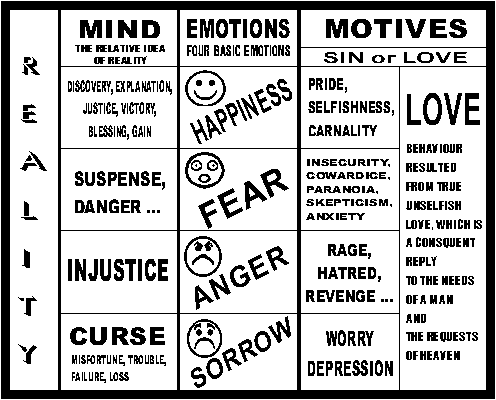A priest suggested to a mother to send her son to a secondary school of theology. As a matter of fact, as a child of divorced parents, in a poor family, her son also came under a bad influence of juvenile delinquents. To this well-intentioned proposal, the mother responded in the following way:
"I cannot give him away! I love him so much!"
The priest continued:
"Don't you believe that your son will be much better off in a theological school than here?"
"I do, but I love him so much! I cannot let him go!"
This mother had a strong feeling of love towards her son but has, still, taken an attitude which is not in agreement with a true, unselfish love and goodness.
Is the problem in the exaggerated strength of her feelings?
No. It is in their role!
And the role of feelings depends on the spiritual condition of the person in question.
A strong feeling of love represents only a occasion for an expression of love you carry within you. However, if you do not have true love within you, if you are empty and discontent in your heart (due to your separateness from God), than you stick to your feelings because they are wrongly oriented and because they rule your behavior.
Accordingly, a strong feeling of love represents a occasion for manifestation of a spiritual condition you are in: either for manifestation of a true unselfish love, or for the manifestation of selfishness.
Feelings are not, and are not to be rational per se. That is why they must never get the role of a motivating power, or they are then to lead us into an irrational behavior.
Feelings should be an adequate response to the reality surrounding us, they are here to take our attention, and to give us a provocation for manifestation of our nature (true love instead of sin).
Naturally, sin does not lie in the unpleasant or pleasant experiences themselves, but in the wrong role that is given to them due to our separation from God. As long as the desires of our hearts are not satisfied, both pleasant and unpleasant experiences are going to represent a temptation for us to fall into sin.
As long as we are in a bad spiritual condition, pleasant experiences are going to represent a temptation for us to become selfish towards them, while the unpleasant ones will make us lose our peace of mind and become upset and angry.
For example, sin is not only pleasant feeling that we have while eating tasty food, but the attempt to satisfy the desires of our heart in them. It is not a sin to feel loved, but it is a sin when we try to fulfill the emptiness of our souls with that feeling (sin is when the feelings have the role of the cause of happiness in us, instead of being the opportunity for its expression). It is not a sin to feel anger and sadness because of the injustice which surrounds us., but it is a sin if we react to this feeling of anger and sadness with concern and anger. Sin is not in feeling fear, but in being a coward.

We should feel fear in danger, but we should react by being brave, and not coward. Towards injustice we should feel anger, but we should react by being meek, and not angry. In misfortune we should feel sadness, but we should react by taking care, and not being worried. When we have blessings we should feel joy, but react by being grateful, and not selfish.
Consequently, there is a difference between emotions and sinful motives.
The solution does not lie in evading pleasant and unpleasant experiences, because they are a constituent part of our reality. The problem is not in what we feel, but in what we are (in our motives), because in corresponding feelings our nature find only the occasion for expressing itself. When the spiritual needs are satisfied, when we are happy in our essence, only then, actual experiences are not going to tempt us, they are going to be a reason (occasion) for an expression of our love.
Our experience of reality should be realistic: adequate to it. If we try to beautify it in order to satiate the thirst of our soul, we shall either become slaves of reality (as our experience of happiness depends on it), or we shall try to escape from reality (in order to create our own experience by ourselves). The first principle could be called materialistic, and the other idealistic.
There is also a third principle, when we do accept an unpleasant reality in order to beautify or justify (rationalize) it just inside our mind by various tricks, so that it does not represent any temptation to us.
A real solution is not in the domain of a change of reality, or in a change of our consciousness (mind), or in a change of our emotions, but in a change of us ourselves, our motives - a transformation of heart.
We will stop being the victims of unpleasant and pleasant circumstances and also slaves of our own thoughts and feelings, only by the transformation of the motives of our hearts. We will become, not the victims, but the creators of the reality, in order not to search for what is missing in our hearts, but to offer what our heart already has in God.